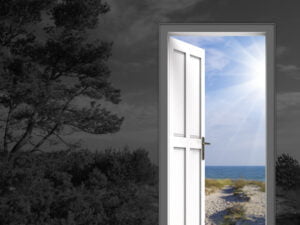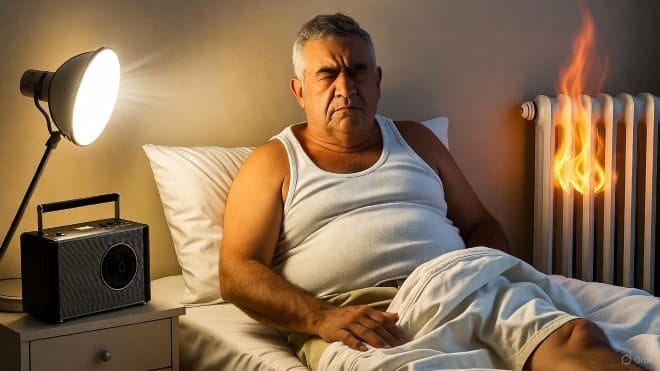You can get a full night of sleep (8 hours) and still wake up drained and groggy. What matters is whether your sleep is interrupted and how often. There are many sleep disruptors that can mess with your sleep and disrupt your sleep cycle. Some of these are small and may simply move you out of deep sleep. Some are bigger distractions which can wake you up and even keep you awake.
These distractions can and will impact your sleep quality. They including too much light, noise, and room temperature being too high to sleep. Each can be easily addressed. Sleep distractions from mouth breathing, has a much bigger impact and can also greatly impact your health.
Eliminating these disruptors should be a priority and are a quick way to get back to deep, restorative rest.
Sleep Disruptor #1: Mouth Breathing
The reason why mouth breathing is such a disruption is that it lowers oxygen delivery during sleep. It also leads to snoring, and because of partial airway collapse, it causes you to repeatedly wake up – even if you don’t notice doing so. Each time your sleep is interrupted from deep sleep, which is needed for mental and physical restoration, you revert to lighter stages of sleep.
Switching from mouth breathing to nasal breathing, is necessary to improve sleep and can be done with practice and using simple tools like nasal dilators, air inhalers, and mouth tape. I don’t recommend using mouth tape until you regularly breath through your nose and doing mild exercise.

Sleep Disruptor #2: Light
Light is a huge disrupter of sleep and a strong signal to your brain, even if it is the faint light coming from your clock, that it is time to be awake. It directly impacts your circadian rhythm by halting your body’s production of melatonin which helps bring on sleep [1]. Having a light on while trying to sleep as well as having too much blue light prior to sleep, will mess up your natural sleep cycle.
Fix it by:
- Dimming lights an hour before bed
- Using blackout curtains or shades
- Cutting out screen time an hour before bedtime
- Changing harsh white bulbs for warmer and softer yellow bulbs
Being aware of and eliminating light before and during sleep will minimize disruption and tell your body that it should shift to sleep.
Sleep Disruptor #3: Noise
You don’t need to have noise wake you to destroy your sleep. While sudden louder sounds keep your brain alert and at attention, lighter, irregular sounds like sounds of appliances running or pets moving, can also break up your sleep.
Fix it by:
- Use white noise such as a fan or air filter to mask sounds
- Wear earplugs to bed
- If your partner snores or has disruptive sleep apnea suggest they switch to nasal breathing
- Keep pets out of the bedroom
Eliminating noise helps your brain relax and fall into deeper stages of sleep allowing for a sound, restful, and restorative sleep.
Sleep Disruptor #4: Temperature
In order to fall into a deep sleep your body needs to cool down a bit. If the room is too hot or even too cold your body can’t switch to its optimal sleeping temperature. If your are too warm, you toss and turn, unable to regulate your temperature and only fall into light sleep [2]. Similarly if too cold you stay awake shivering . Heavy blankets and a warmer than needed thermostat make it harder to reach an ideal temperature to remain comfortable through the night.
Fix it by:
- Set the thermostat between 64–67°F (around 18–19°C) at night
- Using light breathable sheets and blankets
- Don’t eat too close to bed time and avoid eating heavier meals to avoid extra body heat
- Take a warm bath at night. It actually decreases your body temperature for better sleep
Keeping temperature lower at night helps your body fall into deeper, restorative sleep.

Putting It All Together
Each of these disruptors – mouth breathing, light, noise, and temperature— combined destroy the quality of your sleep. You may think you’ve gotten 8 hours of sleep but if none of that time was spent in deep sleep, you are doing harm to your health. Mouth breathing causes the most harm. It keeps your sleep from entering deep stages and can cause serious health issues. Fix this one issue before tackling the others to make the largest impact.
Even with better breathing through the nose throughout the night, the other disruptors can continue to destroy your sleep. Don’t ignore the sound that keeps you awake, the light that messes with your sleep hormone production, or the temperature of your room that leaves your restless for hours. All of these can be addressed with some adjustments and new habits. Tackling all of them can help you fall fast asleep to get the rest you need.
Conclusion
Sleep doesn’t have to be a nightly struggle. Take control of your sleep environment: breathe through your nose, and allow your body and mind to do what they were built to do—recover fully while you sleep.
Address each disruption on its own starting with your breathing. Practice nasal breathing to also eliminate mental distractions that prevent you from falling asleep by reading How to Stop Mental Distractions: Breathing for Better Focus. Then tackle the other environmental disruptions discussed above. One change at a time can lead to better sleep, allowing you to regain your edge.







